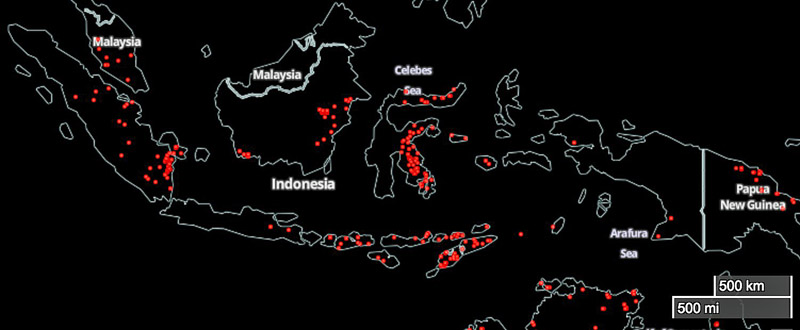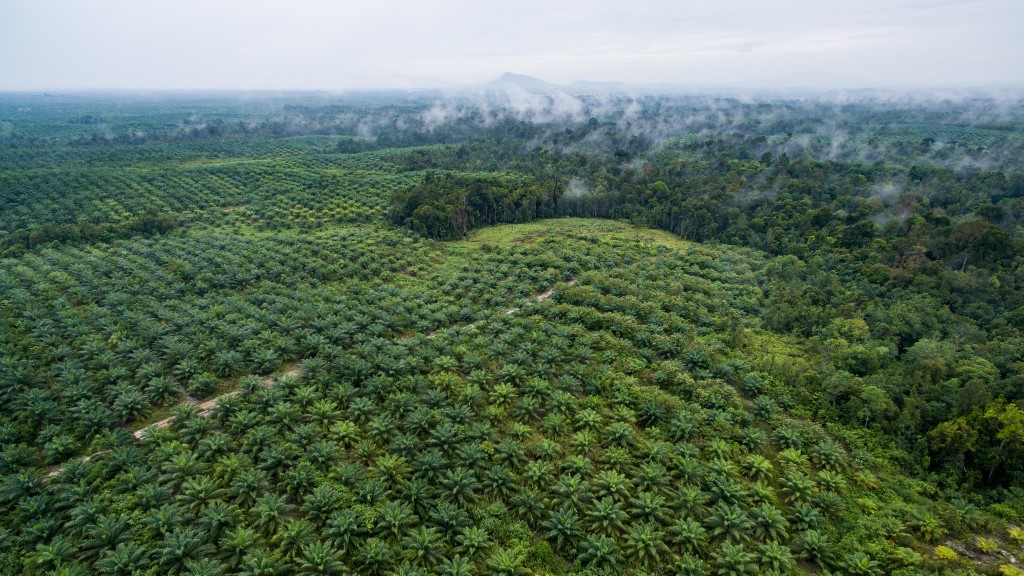Indonesia & Palm Oil are Killing Orangutans

In the worst man-made environmental disaster since the BP gulf oil spill, vast swaths of vital rain forest habitats in Borneo and Sumatra are being consumed by commercial fire.
These fires were intentionally set by palm oil and paper companies, simply because slash & burn agriculture is the cheapest, fastest way to clear land for plantations, because loggers take too much time to do the job for the multi-national corporations like Palmolive, Unilever and Proctor & Gamble.

But these rapid set fires in Indonesia– tens of thousands of them– are raging out of control due to record drought throughout the region.
In places like Pematang Gadung and Sungai Besar, where the forests are filled with orangutans and other endangered species, some animals have died from smoke inhalation, while others have been poached or abducted into the illegal wildlife trade.
But a precious few are being rescued by non-profit organizations such as International Animal Rescue.

But it’s not just animal life that’s endangered: The toxic haze from Indonesia’s fires has created a thick layer of smog over the entire country.
The city of Palangkaraya has become one of the most polluted places on the planet, and locals are literally choking on the devastating effects of unchecked never ending corporate greed.
Experts believe the impact of carbon released from these burning peat forests on climate change will be catastrophic if something isn’t done soon.

Orangutans are badly affected by the smoke. Some suffer upper respiratory tract infections, which can prove fatal. Some of the babies we’ve taken in recently have been suffering from dehydration and undernourishment through lack of food, as well as breathing problems from the polluted air.
Orangutans are seriously threatened by the composite effect of hunting, logging, conversion of habitat for timber, rubber and, especially, palm oil plantations.
Program Director of IAR’s Indonesian initiatives (Yayasan IAR Indonesia) delivers a rescue service for orangutans, providing sanctuary for those unable to be released, rehabilitation for young orangutans and those suitable for future release, and direct translocation for wild orangutans who need to be moved from one area of forest to another.

As with our other projects, we focus on law enforcement and education. We have a strong community element to our work, working with local people in areas of wild orangutan habitat to establish community forest patrols, ecotourism and alternative livelihoods.
We also have a Human Orangutan Conflict Response Team, which responds to instances of conflict– typically orangutans leaving degraded forest areas and moving onto farms in search of food.
Industrialized agriculture has been an important part of Indonesia’s economy since the 1980s, and large tracts of forests were cleared to make way for rubber and palm oil plantations.

But it’s only in recent years that palm oil has become the largest threat to wild orangutans. Massive amounts of lowland tropical rain forest– the orangutan’s preferred habitat– have been cleared in Sumatra and Borneo to make way for the crops.
In Ketapang, we’ve seen a steady increase in the numbers of orangutans in need of rescue. Up to 75% of the wild population is distributed in non-protected areas, which are mostly used for the development of industrial agriculture, logging and mining. So orangutans are under a lot of anthropocentric pressure.
But the main threat right now is the forest fires raging throughout Borneo, in both non-protected and protected areas. They’re very difficult to stop because of a long-lasting drought caused by El Niño. This will decimate the numbers of orangutans in the wild and, if it continues, put them at serious risk of extinction.

When fires are burning out of control and you see orangutan habitat being destroyed, it’s difficult to see how many of these small populations can survive. Even if we could rescue them all, there’s not enough rescue center space for all of them, nor suitable forest in which to release them.
Even in national parks– which should, legally, be safe havens for wildlife– fires are burning out of control. The largest populations of wild orangutans, in the Sebangau and Tanjung Puting National Parks, are severely threatened.
Fires are started sometimes by industrial plantations who log the area, then start fires to clear the land, which is illegal. Or by locals engaging in slash & burn agriculture. They’re spreading out of control, exacerbated by the unusually long dry season we’re having.
The only way to save the orangutans is by rescuing them and bringing them to the safety of the centre (if they have injuries or are malnourished) or to the wild (if there’s protected forest where they can be safe). At the moment this is difficult, because nowhere is safe from fires.
Rescues are always stressful– risky for the animals and risky for the people. It requires an experienced team that understands their behavior and knows when to take action.
The orangutans must be sedated with a dart gun. The vets calculate the dose and a sniper conducts the darting. The sedated orangutan will fall from the tree, so there has to be a team of people holding a net.

These rescues are often a life-or-death situation because they’re considered the last choice when it’s clear that the orangutan will not survive otherwise.
Once the fires are out, when the rainy season comes (which experts say could take months), we’ll have to assess the areas that have been burnt and can be reforested, and we’ll need funds for that.
Locals normally burn their land to prepare for the next crop rotation. This practice is ingrained in rural Indonesian culture.

To prevent this happening in the future, we’ll need to conduct awareness activities on prevention, such as training farmers in the use of organic farming techniques in which the land does not need to be burnt.
Their plight is very critical and the situation doesn’t seem to be getting better. But we must keep our hopes up, otherwise we wouldn’t be here. We must believe that more people will care about this situation and try to help in every way they can.
Our way of life in the west is directly impacting these orangutans. This palm industrially planted in Indonesia goes to western markets. We must change our way of life if we want to protect the environment. We must push the oil palm industry to stop forest destruction.

We won’t be able to save the orangutans if the private sector– the oil palm industry– does not take an active role in conservation and minimize the devastating effects of their business activities on the biodiversity of Borneo and Sumatra.
Baby orangutans normally learn survival skills from their mother, but orphans must learn from other orangutans. The rehabilitation center is like a “forest school” for these orphaned babies.
Our caregivers spend all day with these orangutans in the forest, so we need two to three shifts of people daily, because all orangutans must be under the watch of our caretakers and vets.
Green Global Travel/ Crickey Conservation Society Foundation Curacao.

The West must stop plundering and destroying other countries in exchange for greedy misfit profits?
LikeLiked by 1 person
Until the day they choke on it, it will never stop?
LikeLike
Stop buying products that were prepared with Palm Oil?
LikeLiked by 1 person
The only way to minimize destruction of nature.
LikeLike
Money, money, money ….its a sickening world we live in?
LikeLiked by 1 person
First they chop down the forests with a plywood factory in the middle, followed up by palm oil- and other plantations, so in the end nature lovers can start rebuilding parts of the destroyed woods and habitats for animals to bounce back. All three systems are based on profits as eco-tourism will close the last gate?
LikeLiked by 1 person
Suffering included?
LikeLike